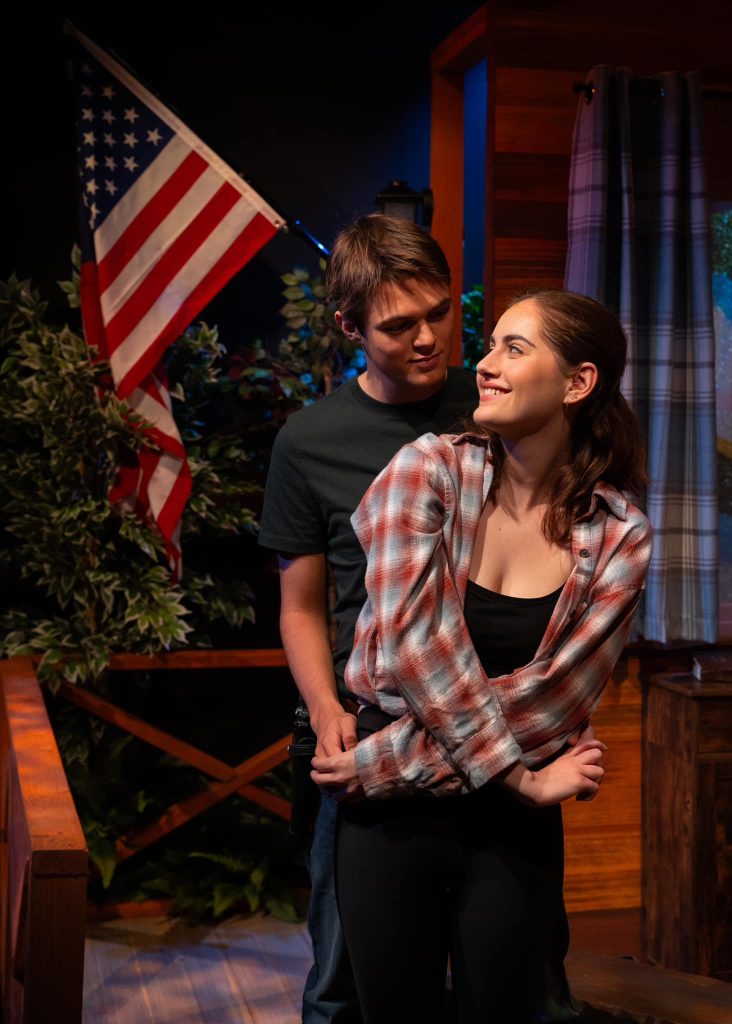A cautionary tale forged in the fire of current events, Theatre Lab’s chilling production of playwright Deborah Zoe Laufer’s “The Last Yiddish Speaker” hits uncomfortably close to home. Borrowing and updating elements from both nonfiction and dystopian fiction—The Diary of Anne Frank, The Handmaid’s Tale and The Plot Against America should be included in the play’s syllabus—Laufer’s magnum opus is about many things: the varying but ceaseless persecution of the Jews; the necessity of identity and culture, even when—especially when—their existences are threatened; the boiling-frog creep of fascism. But in light of the most important election of our lifetimes in just a few days’ time, this convincing and very American nightmare scenario is most successful at putting a lie to the fragile sense of security to which we’ve always held: that it can’t happen here.
“The Last Yiddish Speaker” is set in a rustic cabin somewhere far removed from cities, a place that would make for a lovely backdrop in Garden & Gun magazine: rifle mounted on the wall, no fewer than three crucifixes from living room to kitchen, cute little bear trinkets on the dinner table. (The detail-oriented set is another marvel from designer Michael McClain.) Its occupants could be any conservative-minded family: In the opening scene, Paul (Stephen Schnetzer), who works at Walmart, arrives home with his daughter Sarah (Gemma Berg), and one of his first instructions, “clean your rifle,” is delivered with the same dutiful banality as “brush your teeth.”
And yet, as we soon learn, they are imposters in their own home. Paul and Sarah are secretly Jewish, and living under assumed identities in the midst of a Christian nationalist police state whose armies have already “disappeared” Sarah’s mother. They’ve even been assigned their version of a Stasi officer—a 17-year-old, pistol-carrying “inspector” named John (Gage Calenius) who makes nearly daily rounds snooping through their private places, from bedrooms to internet search histories. The year is 2029.

We don’t find all of this out at once; Laufer is, thankfully, not one for frontloading exposition. The information is delivered like a Polaroid evolving from blurry abstraction to piercing clarity—world-building at its nuanced best. Gradually, we learn of a pivotal “Save America” rally and an apparently successful insurrection against the U.S. government that led first to voluntary requests for non-Christians, LGBTQ folks and dissidents to leave the country, which then led to mandatory orders from a theocratic dictatorship and the current status quo, in which harboring fugitives is punishable presumably by death.
Which brings us to the title: “The Last Yiddish Speaker” refers to Patti Gardner’s Chava, a long-lost aunt deposited on Paul’s doorstep like an unwanted baby. Her presence, seemingly both physical and spectral—she bears a numbered Holocaust tattoo, and purports to have had 15 marriages across 1,000 years on Earth—draws a further wedge between Sarah, who dreams of fleeing to the freedom of Canada (through a border wall that has been puportedly erected by the U.S.) and fighting against a regime that denies her basic freedoms, and Paul, who would prefer to assimilate into the nice-enough life they’ve built for themselves, as long as they, you know, don’t talk politics with the neighbors.

Laufer, directing her own play, generates an atmosphere of hushed paranoia, where every knock on the door is suspect, every gunshot in the near distance could easily be directed at our protagonists, and where an errant cough is enough to cause their entire façade of comfort to crumble. Berg delivers an impassioned, complicated performance as Sarah, who is both romantically affectionate toward John and an increasingly outspoken vessel of rage against the theocracy he represents—a challenging needle to thread. Gardner injects a modicum of comic relief (much needed), but it’s her deft command of Yiddish (kudos to Avi Hoffman, serving as Yiddish advisor) and world-weary body language that sell her vital role as much as her character’s broken English.
While more docile than his daughter, Schnetzer’s Paul is, like Sarah, a suppressed fount of inner conflict forced to resolve itself, but the actor navigates the character less successfully than his colleagues in the cast. In this past Thursday’s performance, at least, there were moments when his line readings felt stilted, and he wore the part a bit like a suit that didn’t quite fit.
Calenius, in his very first professional role, is the revelation here, creating a plausible, two-faced embodiment of a puritanical goose-stepper for, I’ll just say it, Trump’s America. “We were just taking our country back,” he corrects Paul, who “misspoke” by referring to the war John’s side started, in the chipper tone of the fully indoctrinated true believer who knows no other worldview. There’s no moment more sobering than when his friendly chitchat with Paul and Sarah turns on a dime, and Calenius suddenly charges through the house, gun cocked, at the whisper of a sound.
Collectively, these artists steward a play that punches well above its weight as a new work; it feels road-tested and ready for prime time. Thematically, though, it could only come as the result of our politics’ perilous recent turns and potential turns; it burns hot with the sear of the zeitgeist. The year 2029 is not far off. It’s up to us to ensure that “The Last Yiddish Speaker” remains speculative fiction, not prophecy.
“The Last Yiddish Speaker” runs through Nov. 10 (with a possible extension planned) at Theatre Lab at FAU, 777 Glades Road, Boca Raton. Tickets cost $35-$45. Call 561/297-6124 or visit fauevents.com.
For more of Boca magazine’s arts and entertainment coverage, click here.







